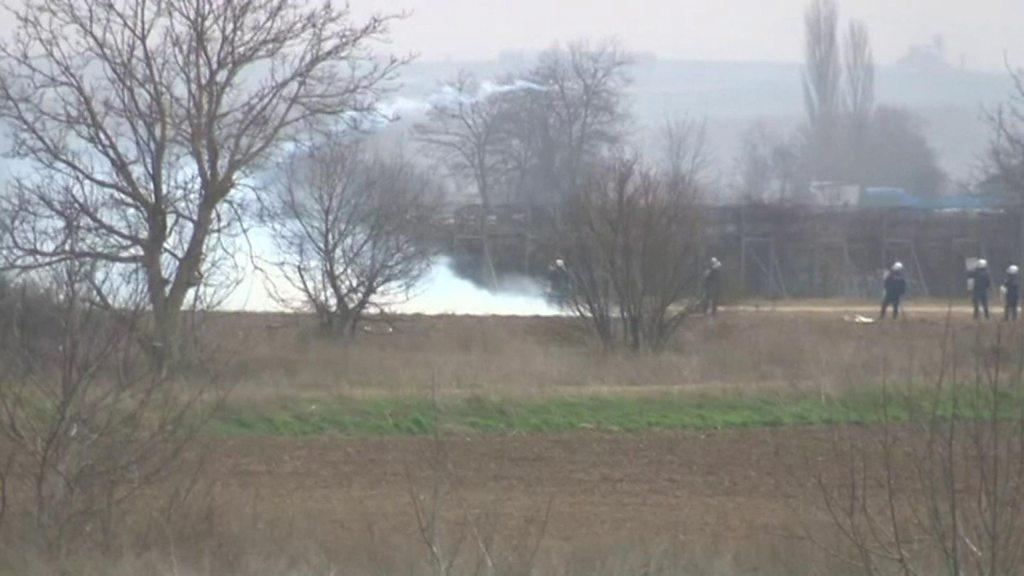Turkey claims migrant killed in Greek border clash
- Published
Greece says it has stopped more than 27,000 people entering the country illegally since Saturday
Turkish officials have said a man was fatally wounded when Greek security forces opened fire as migrants gathered at the border on Wednesday.
Greece immediately issued a flat denial, saying it was not involved in any such incident involving gunfire.
Thousands of people have headed to the border after Turkey said it would no longer stop migrants crossing.
Greece has also denied claims that two Syrians were fatally shot while trying to cross the border last night.
What happened at the border?
Videos taken close to Turkey's northern border with Greece on Wednesday showed dozens of migrants hurrying through a field, escaping tear gas. Several men are seen carrying a man in a blanket as he held his head.
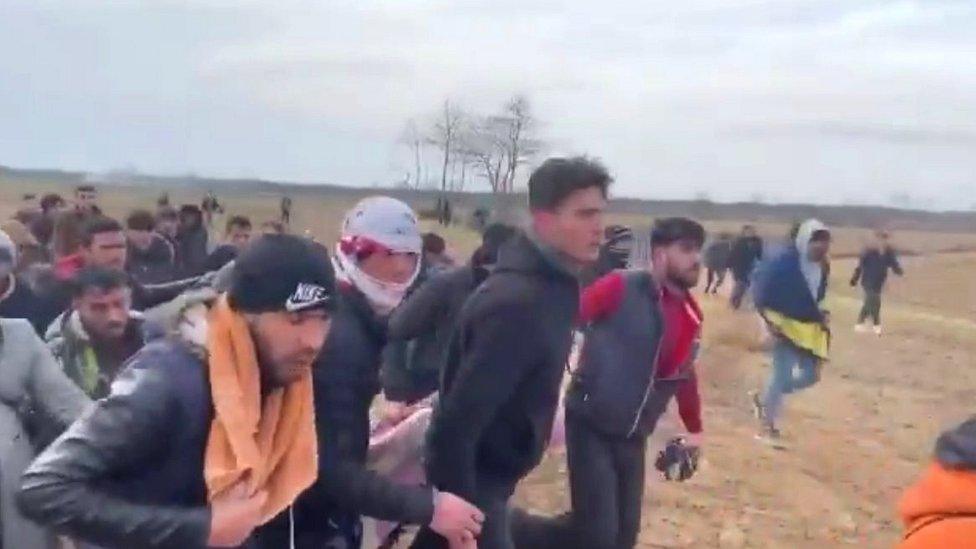
A group of men carried the man in a blanket away from the border and Turkey said he died later in hospital
One of the men, speaking in Farsi, is heard on a video saying Greek soldiers had fired at their legs and that five migrants were wounded.
The local authority in the nearby town of Edirne then issued a statement saying one migrant had died in hospital and five had been wounded. It accused Greek police and border units of opening fire on migrants in no-man's land between the Greek border gate at Kastanies and the Turkish gate at Pazakule.
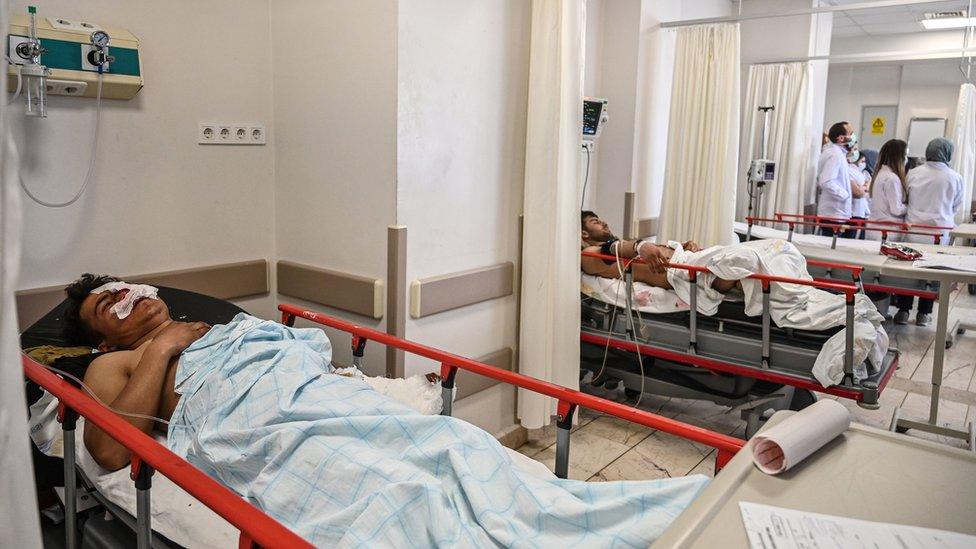
Several people were being treated for injuries in Trakya University Hospital
Greek government spokesman Stelios Petsas was adamant there had been "no such incident with fire from the Greek authorities" and accused Turkey of "creating and spreading fake news".
Three men from Afghanistan and Senegal have told the BBC's Jonah Fisher of an earlier incident on Tuesday night in which they said they saw two Syrians fatally shot in the neck and head.
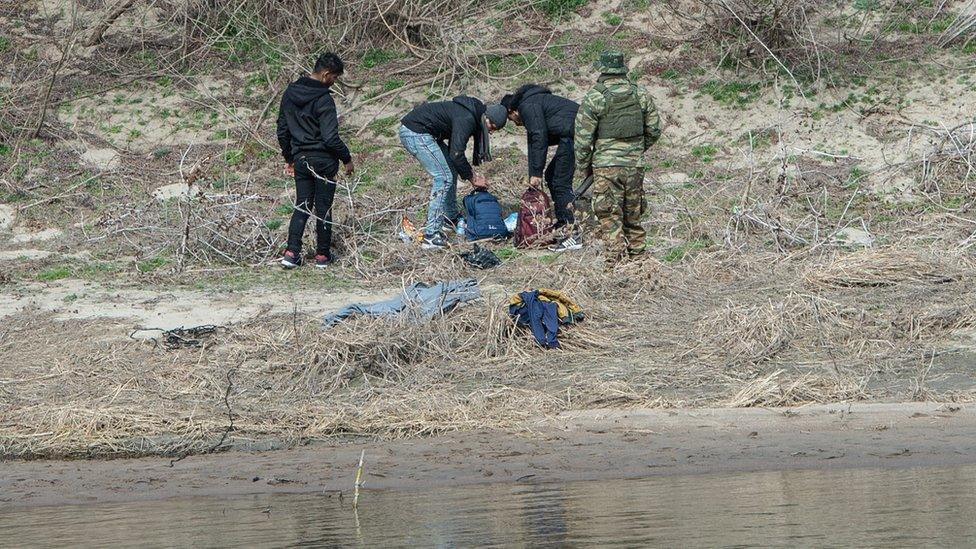
Greek border guards have detained dozens of migrants who crossed into the country over the River Evros
The men said it happened as they tried to cross the river which acts as a border at Ipsala, some 120km (75 miles) south of Edirne.
The River Evros is now heavily fortified, with Greek security forces every few metres, our correspondent reports.
Greek authorities told the BBC that no migrants had either been killed there or injured.
How it started
When at least 50 Turkish soldiers were killed in northern Syria in late February, President Recep Tayyip Erdogan said Turkey was facing a major influx of people fleeing Russian and Syrian air strikes and that it could not handle another wave of refugees.
Turkey already has 3.7 million refugees from the conflict in Syria, but after the European migrant crisis in 2015 it signed a deal with the EU to stop more migrants heading into Greece.
Although the EU promised billions more euros in aid, Turkey was unimpressed and decided to open its borders with Greece and even bussed migrants close to the north-western border.
Greek coastguards shot into the sea beside this migrant dinghy and pushed it around with their boats
Greece said this week the migrants were being "manipulated as pawns" by Turkey in an attempt to exert diplomatic pressure. It increased security measures and halted for a month all asylum claims from migrants who had entered Greece illegally.
Greece says that since Saturday it has prevented 32,423 migrants from coming into the country illegally and arrested 231 people.
In just 12 hours on Wednesday, 4,600 attempts to enter Greece illegally were stopped, it adds.
President Erdogan argued on Wednesday that the decision to open the border gates was "fully" in line with international law, and he accused Greece of "inhumane scenes" over a video on Monday showing Greek coastguards firing into the sea near a migrant dinghy.
The coastguards barred the migrants from coming any closer although other dinghies managed to get through.
A Greek navy ship docked in Lesbos on Wednesday and officials say it will take 500 people who have arrived on the island since the start of the month.


Top EU officials have visited the area, which serves as the bloc's south-eastern border, promising financial help to the Athens government to step up security.
European Commission President Ursula von der Leyen described Greece as a "European shield", using the Greek world aspida.
Prime Minister Kyriakos Mitsotakis said Greece could not and would not be "blackmailed".
In a statement on Wednesday the European Council accused Turkey of using migrants for political purposes, external and it called on the country to abide by the 2016 deal.
It said that member states and agencies were prepared to increase the EU's presence on borders, including sending guards and equipment to police them using the Frontex agency rapid border intervention.
- Published3 March 2020
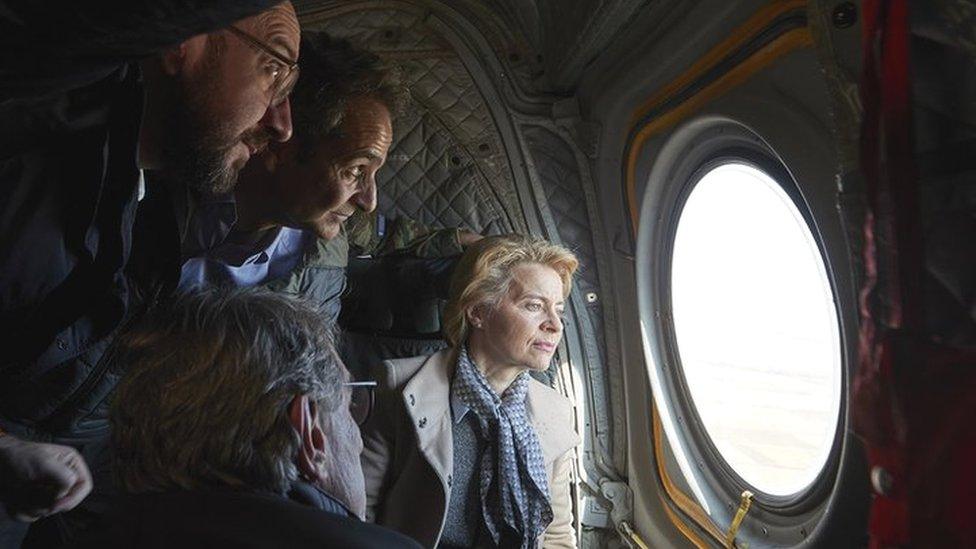
- Published4 March 2020
